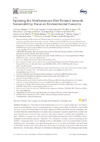Identificador persistente para citar o vincular este elemento:
https://accedacris.ulpgc.es/jspui/handle/10553/76436
| Título: | Updating the mediterranean diet pyramid towards sustainability: Focus on environmental concerns | Autores/as: | Serra Majem, Luis Tomaino, Laura Dernini, Sandro Berry, Elliot M. Lairon, Denis de la Cruz, Joy Ngo Bach-Faig, Anna Donini, Lorenzo M. Medina, Francesc Xavier Belahsen, Rekia Piscopo, Suzanne Capone, Roberto Aranceta Bartrina, Javier Vecchia, Carlo La Trichopoulou, Antonia |
Clasificación UNESCO: | 32 Ciencias médicas 3206 Ciencias de la nutrición |
Palabras clave: | Environmental Concerns Food-Based Dietary Guidelines Mediterranean Diet Mediterranean Diet Pyramid Nutrition, et al. |
Fecha de publicación: | 2020 | Publicación seriada: | International Journal of Environmental Research and Public Health | Resumen: | Nowadays the food production, supply and consumption chain represent a major cause of ecological pressure on the natural environment, and diet links worldwide human health with environmental sustainability. Food policy, dietary guidelines and food security strategies need to evolve from the limited historical approach, mainly focused on nutrients and health, to a new one considering the environmental, socio-economic and cultural impact—and thus the sustainability—of diets. Objective: To present an updated version of the Mediterranean Diet Pyramid (MDP) to reflect multiple environmental concerns. Methods: We performed a revision and restructuring of the MDP to incorporate more recent findings on the sustainability and environmental impact of the Mediterranean Diet pattern, as well as its associations with nutrition and health. For each level of the MDP we provided a third dimension featuring the corresponding environmental aspects related to it. Conclusions: The new environmental dimension of the MDP enhances food intake recommendations addressing both health and environmental issues. Compared to the previous 2011 version, it emphasizes more strongly a lower consumption of red meat and bovine dairy products, and a higher consumption of legumes and locally grown eco-friendly plant foods as much as possible. | URI: | https://accedacris.ulpgc.es/handle/10553/76436 | ISSN: | 1661-7827 | DOI: | 10.3390/ijerph17238758 | Fuente: | International Journal of Environmental Research and Public Health [ISSN 1661-7827], v. 17 (23), 8758, p. 1-20, (Diciembre 2020) |
| Colección: | Artículos |
Citas SCOPUSTM
257
actualizado el 08-jun-2025
Citas de WEB OF SCIENCETM
Citations
281
actualizado el 08-feb-2026
Visitas
71
actualizado el 10-ene-2026
Descargas
86
actualizado el 10-ene-2026
Google ScholarTM
Verifica
Altmetric
Comparte
Exporta metadatos
Los elementos en ULPGC accedaCRIS están protegidos por derechos de autor con todos los derechos reservados, a menos que se indique lo contrario.
